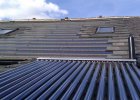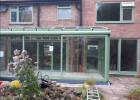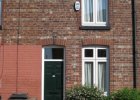Green Open Homes Greater Manchester
19 - 20 Oct 2019
For more information and tickets: www.eventbrite.co.uk/e/virtual-green-homes-qa-with-homeowners-tickets-419705148397
This event has now finished.
Other Kit will be attending our online Q&A
The Zetland Passive House is Europe's first Passivhaus EnerPHit Plus home. These luxurious 5-bedroom townhouses are a showcase of sustainable building from the exterior finish to the interior decor.
Energy Saving Improvements
‘Big’ insulation works
Development of new blown insulation application techniques for retrofit projects.
Glazing upgrades
Triple glazed passivhaus units, stained glass windows and doors
Lighting systems and electrical appliances
LED lighting throughout house (strip and filament LED), Appliances with a minimum A++ energy rating
Heating system upgrades
Backup 5kW DiBT accredited Log Burning Stove. Central heating free design (post heater only). Mixergy tank technology with novel thermocline control, powered by excess PV electricity. MVHR - Paul Novus 300.
Renewables: electricity
10kW Photovoltaic Thermal System.
Water management
Sustainable Urban Drainage (SUDS). Flow restricted aerated taps and showers throughout and grey water recycling toilets.
Use of sustainable building materials
Wood fibre and cellulose (recycled newspaper). Lime plaster/render, Timber frame hybrid construction, copper/brass/lead, breathable magnesium construction boards, Intello beating Siga intelligent building membrane and tapes.
Any other improvements
Retained existing fabric, no extensions added in the name of carbon reduction. Full conservation approach to restore Victorian feel.
Background and motivations
What motivated you to make these measures?
Pushing the art of the possible within the built environment.
Why did you choose these particular measures?
To achieve both Passivhaus EnerPHit Plus certification and to do so without any extensions, concrete, nor petrochemicals.
What did the work entail for you? Did you do works yourself or hire someone else? How did you find and choose a builder/supplier?
Our own development firm.
What difference has these measures made in your home (e.g., reduced energy use, saved money on bills, more comfortable)? If you track any changes quantitatively, how do you do this?
Draught free, damp free, constant temperature, controlled humidity.
Estimated energy savings:
Space Heating: Total heating demand per year 2353 kWh per year according to PHPP calculation. This is to be satisfied using a combination of wood burning stove and excess PV electricity to the post heater.
Electricity: PHPP calculation suggests 2038 kWh per year. Part grid part PV supplied
Hot Water: 1930 kWh per year. Part grid part PV supplied
Water: No calculation available on PHPP. Using averages @ 125l/person per day and PHPP occupancy of 3.05 gives 140 cubics per year @ £1.87 per cubic. Standing charge per year £40 and highway drainage £102. Sewerage @£1.23 per cubic. Total estimate: £576
Council tax Band D = £1566.79
PV generation is 4275 kWh per year: FIT will pay £167 per year and with a 20% export an additional £28. Assuming an 80% utilisation factor for the PV = 3420kWh per year.
Biomass costs ~£80 per cubic unstacked logs with 2600kWh = 3.85p/kWh @ 75% efficiency. Assume 1 cubic of logs are burnt per year, total remaining heating demand is 403kWh per year.
Tonik energy 100% renewable tariff costs £73 per year standing charge and 12.68p per kWh.
Total Electricity bill including standing charge, FIT, export, PV direct consumption and biomass for household electric, hot water and space heating = £0
Total Energy bill = £80 for biomass. In reality 1 cubic of timber per year could easily be sourced for free!
Relevant links
https://www.ecospheric.co.uk/zetland https://www.passivhaustrust.org.uk/projects/detail/?cId=91
https://passivehouse-database.org/index.php?lang=en#d_5807



